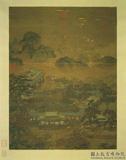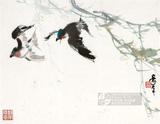宋蔡襄自書謝表並詩 卷
推薦分享
資源連結
連結到原始資料 (您即將開啟新視窗離開本站)後設資料
- 資料識別:
- 故書000042N000000000
- 資料類型:
- 類型:書法
- 型式:文字
- 著作者:
- 蔡襄
- 出版者:
- 數位化執行單位:國立故宮博物院
- 格式:
- 本幅 24.8x107.9公分、隔水一 10.9公分、隔水二 10.8公分、拖尾 24.8x93.4 公分
- 語言:
- 漢文
- 關聯:
- 石渠寶笈初編(御書房),下冊,頁897&*故宮書畫錄(卷一),第一冊,頁45-46&*蔡襄〈西元1012─1067年〉,福建仙遊人,字君謨。天聖八年〈1030年〉中進士,一生仕途順利,累官諫院,直史館。性忠正,工詩文,善書法。 蔡襄書法初學周越,後出入顏真卿、虞世南、王獻之,行、楷書簡札典雅秀麗。其書溫和平正,不作奇峭取勢之筆,用筆柔順,無一筆不盡變之能。此卷為宋仁宗皇祐四年〈1052年〉上親書「君謨」二字賜之,蔡襄獲此殊遇,表謝君恩,附以七言律詩一首。然其筆法姿媚,惟頓挫轉折之際,欠缺筆力,疑為後人倣作。&*Ts'ai Hsiang(style name Chü-mo)was a native of Hsien-yu, Fukien. He received the chin-shih civil service degree in 1030. His entire career as an official progressed smoothly with successive promotions in the Remonstrance Bureau and the Secretary Office. Loyal and virtuous by nature, he was excelled at poetry and skilled at calligraphy. Ts'ai initially studied the calligraphy of Chou Yüeh(fl. 1023-1048)and later studied the manner of Yen chen-ch'ing(709-785),Yü Shih-nan(558-638),and Wang Hsien-chih(344-388). His semi-cursive and standard scripts are classic and stately. His calligraphy is gentle and orderly without sharp and forceful strokes. In his gently yielding brushstrokes, there are rich variations. In 1052 Emperor Jen –tsung bestowed his calligraphy of the two characters, chün-mo, on Ts'ai. To express his gratitude for the emperor's magnanimity, Ts'ai wrote this memorial and added a poem at the end. Although the brushwork is beautiful, they lack strength. Thus it is suspected that this is a copy by a later follower.
- 管理權:
- 國立故宮博物院
授權聯絡窗口
- 國立故宮博物院圖像授權、出版授權、影音資料授權-申請流程說明
http://www.npm.gov.tw/zh-TW/Article.aspx?sNo=03003061






